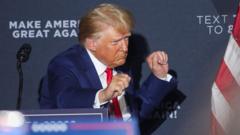Eddy Grant’s legal battle with the former President began in 2020
Former US President Donald Trump has been found liable to pay damages to London singer and songwriter Eddy Grant for using his song Electric Avenue without permission.
It has taken Mr Grant, 76, more than four years to sue the Republican candidate in this year’s presidential election in the US courts, over his 2020 campaign video that used a 40-second clip of the song.
The video was viewed 13.7 million times before Twitter, now known as X, took it down.
A federal judge in Manhattan ruled Mr Trump breached Mr Grant’s copyright for his 1983 hit, and is now liable for damages as well as paying for the singer’s legal fees.
Cease and desist
Mr Grant’s battle with the former President began in August 2020, before his election to the White House, when the songwriter’s counsel, Wallace E.J. Collins, issued a cease and desist letter to Donald Trump’s campaign team.
On Friday, Judge John G. Koeltl rejected arguments from Mr Trump’s lawyers that the Twitter video was shielded under copyright’s fair use doctrine, which allows for the use of protected works in certain situations.
Brian D. Caplan, Mr Grant’s attorney, told Business Insider, external: “As a staunch believer of artist’s rights and the ability to control their creative output, Mr. Grant believes that the decision will help others in their fight against the unauthorized use of sound recordings and musical compositions.
“Politicians are not above the law and the court reaffirmed that.”
Image source, Getty Images
Eddy Grant was nominated for a Grammy Award in 1984 for Electric Avenue
Brixton riots
Earlier this month a US judge has ordered the Trump campaign to stop using the song Hold On, I’m Coming at his rallies, in response to a lawsuit from the family of the song’s co-writer, Isaac Hayes.
Dozens of other artists have objected to the use of their songs at Trump rallies in recent months including Abba, Foo Fighters, Celine Dion and Johnny Marr.
Electric Avenue takes its name from the south London road in Brixton, the first market street in the capital to be lit by electricity. It still forms part of Brixton Market today.
It inspired the title of Mr Grant’s song, written as a response to the 1981 Brixton riots, which reached number two in the charts in both the UK and the US.
Mr Trump’s team has been approached for comment about the Electric Avenue court case.
Listen to the best of BBC Radio London on Sounds and follow BBC London on Facebook, external, X, external and Instagram, external. Send your story ideas to hello.bbclondon@bbc.co.uk, external

